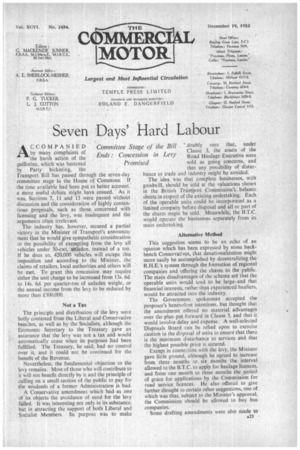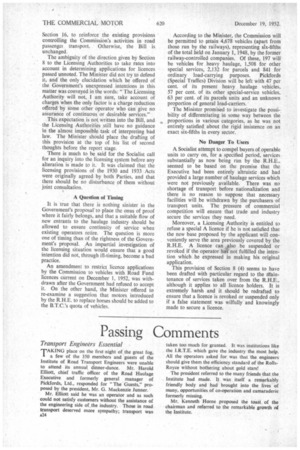Seven Days' Hard Labour A CCOMPANIED by many complaints of the
Page 25

Page 26

If you've noticed an error in this article please click here to report it so we can fix it.
harsh action of the guillotine, which was hastened by Party bickering, the Transport Bill has passed through the seven-day committee stage in the House of Commons. If the time available had been put to better account, a more useful debate might have ensued. As it was, Sections 7, 11 and 13 were passed without discussion and the consideration of highly contentious proposals, such as those concerned with licensing and the levy, was inadequate and the arguments often irrelevant.
The industry has, however, secured a partial victory in the Minister of Transport's announce; ruent that he would give sympathetic consideration to the possibility of exempting from the levy all vehicles under 30-cwt. unladen, instead of a ton. If he does so, 420,000 vehicles will escape this imposition and according to the Minister, the claims of retailers, local authorities and others will be met. To grant this concession may require either the unit charge to be increased from 13s. 6d. to 14s. 6d. per quarter-ton of unladen weight, or the annual income from the levy to be reduced by more than £300,000.
Not a Tax The principle and distribution of the levy were hotly contested from the Liberal and Conservative benches, as well as by the Socialists, although the Economic Secretary to the Treasury gave an assurance that the levy was not a tax and would automatically cease when its purposes had been fulfilled. The Treasury, he said, had no control over it, and it could not be continued for the benefit of the Revenue.
Nevertheless, the fundamental objection to the levy remains. Most of those who will contribute to it will not benefit directly by it and the principle of calling on a small section of the public to pay for the misdeeds of a former Administration is bad.
A Conservative amendment which had as one of its objects the avoidance of need for the levy failed. It was interesting not only in its substance, but in attracting the support of both Liberal and Socialist Members. Its purpose was to make ' doubly sure that, under Clause 3, the assets of the Road Haulage Executive were sold as going concerns, and that any possibility of disturbance to trade and industry might be avoided.
The idea was that complete businesses, with goodwill, should be sold at the valuations shown in the British Transport Commission's balance sheets in respect of the existing undertaking. Each of the operable units could be incorporated as a limited company before disposal and all or part of the shares might be sold. Meanwhile, the B.T.C. would operate the businesses separately from its main undertaking.
Alternative Method This suggestion seems to be an echo of an opinion which has been expressed by some backbench Conservatives, that denationalization might more easily be accOmplished by decentralizing the R.H.E.'s system through the formation of regional companies and offering the shares to the public. The main disadvantages of the scheme are that the operable units would tend to be large-and that financial interests, rather than experienced hauliers, would be attracted into the industry.
The Government spokesman accepted the proposer's benevolent intentions, but thought that the amendment offered no material advantages over the plan put forward in Clause 3, and that it would involve delay and expense. A well-selected Disposals Board can be relied upon to exercise caution in the disposal of units to ensure that there is the minimum disturbance to services and that the highest possible price is secured. Except in connection with the levy, the Minister gave little ground, although he agreed to increase from three months to six months the interval allowed to the B.T.C. to apply for haulage licences, and from one month to three months the period of grace for applications by the Commission for road service licences. He also offered to give further thought to certain other suggestions, one of which was that, subject to the Minister's approval, the Commission should be allowed to buy bus companies. Some drafting amendments were also made to A23 Section 16, to reinforce the existing provisions controlling the Commission's activities in road passenger transport. Otherwise, the Bill is unchanged.
The ambiguity of the direction given by Section 8 to the Licensing Authorities to take rates into account in determining applications for licences passed unnoted. The Minister did not try to defend it, and the only elucidation which he offered of the Government's unexpressed intentions in this matter was conveyed in the words: "The Licensing Authority will not, I am sure, take account of charges when the only factor is a charge reduction offered by some other operator who can give no assurance of continuous or desirable services."
This expectation is not written into the Bill, and the Licensing •Authorities still have no guidance in the almost impossible task of interpreting bad law. The Minister should place the drafting of this provision at the top of his list of second thoughts before the report stage.
There is much to be said for the Socialist call for an inquiry into the licensing system before any alteration is made to it. It was claimed that the licensing provisions of the 1930 and 1933 Acts were originally agreed by both Parties, and that there should be no disturbance of them without joint consultation.
A Question of Timing It is true that there is nothing sinister in the Government's proposal to place the onus of proof where it fairly belongs, and that a suitable flow of new entrants to the haulage industry should be allowed to ensure continuity of service when existing operators retire. The question is more one of timing than of the rightness of the Government's proposal. An impartial investigation of the licensing situation would ensure that a good intention did not, through ill-timing, become a bad practice.
An amendment to restrict licence applications by the Commission to vehicles with Road Fund licences current on December 1, 1952, was withdrawn after the Government had refused to accept it. On the other hand, the Minister offered to re-examine a suggestion that motors introduced by the R.H.E. to replace horses should be added to the B.T.C.'s quota of vehicles. According to the Minister, the Commission will be permitted to r,etain 4,678 vehicles (apart from those run by the railways), representing six-fifths of the total held on January 1, 1948, by the former railway-controlled companies. Of these, 197 will be vehicles for heavy haulage, 1,508 for other special services, 2,132 for parcels and 841 for ordinary load-carrying purposes. Pickfords (Special Traffics) Division will be left with 47 per cent. of its present heavy haulage vehicles, 57 per cent. of its other special-service vehicles, 63 per cent. of its parcels units and an unknown proportion of general load-carriers. The Minister promised to investigate the possibility of differentiating in some way between the proportions in various categories, as he was not entirely satisfied about the rigid insistence on an exact six-fifths in every sector.
No Danger To Users A Socialist attempt to compel buyers of operable units to carry on, for a specified period, services substantially as now being run by the R.H.E., seemed to be based on the premise that the Executive had been entirely altruistic and had provided a large number of haulage services which were not previously available. There was no shortage of transport before nationalization and there is no reason to suppose that necessary facilities will be withdrawn by the purchasers of transport units. The pressure of commercial competition will ensure that trade and industry secure the services they need.
Moreover, a Licensing Authority is entitled to refuse a special A licence if he is not satisfied that the new base proposed by the applicant will conveniently serve the area previously covered by the R.H.E. A licence can .11so be suspended or revoked if the operator ha' not fulfilled the intention which he expressed in making his original application.
This provision of Section 8 (4) seems to have been drafted with particular regard to the riaintenance of services taken over from the R.H.E., although it applies to all licence holders. It is extremely harsh and it should be redrafted to ensure that a licence is revoked or suspended only if a false statement was wilfully and knowingly made to secure a licence.




















































































